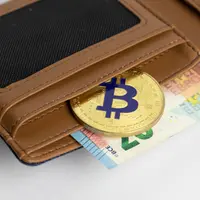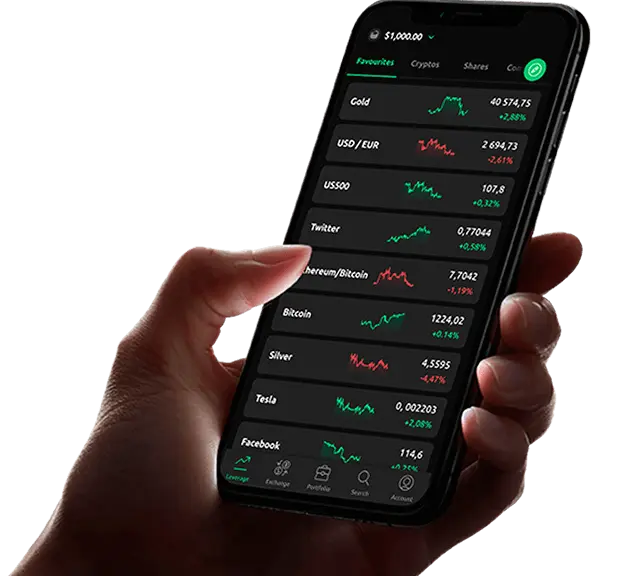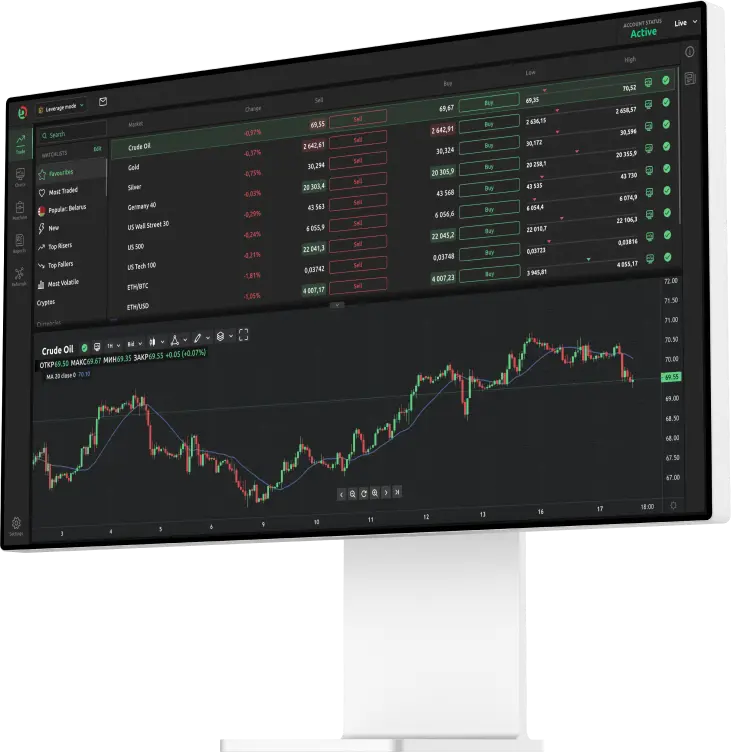You may be surprised at the number of coins on the market and the different use cases they offer
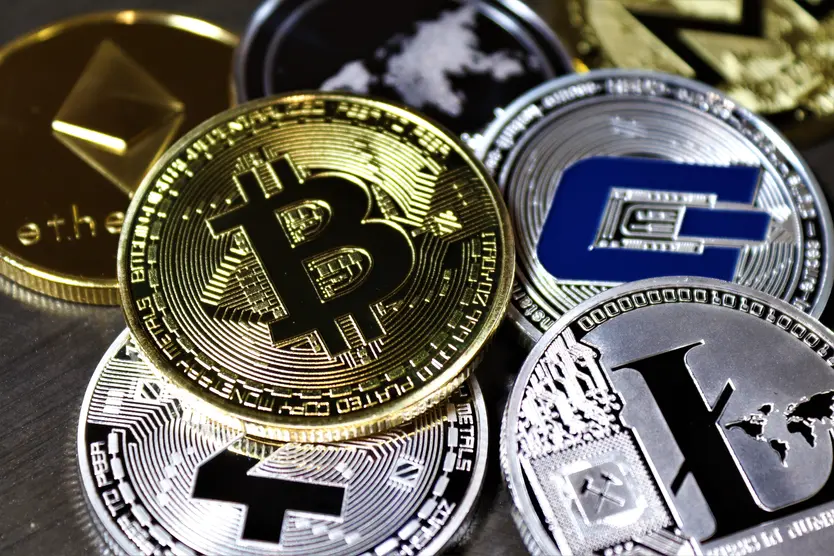
Contents
- How many cryptocurrencies will survive?
- How many types of cryptocurrencies are there?
- How many different cryptocurrencies are there?
- How many crypto coins are there, and why cryptocurrencies matter
- FAQs
How many cryptocurrencies are there? Well, according to data from Statista, there are currently more than 9,900 in existence. New tokens are popping up all the time – each with a different use case and backstory.
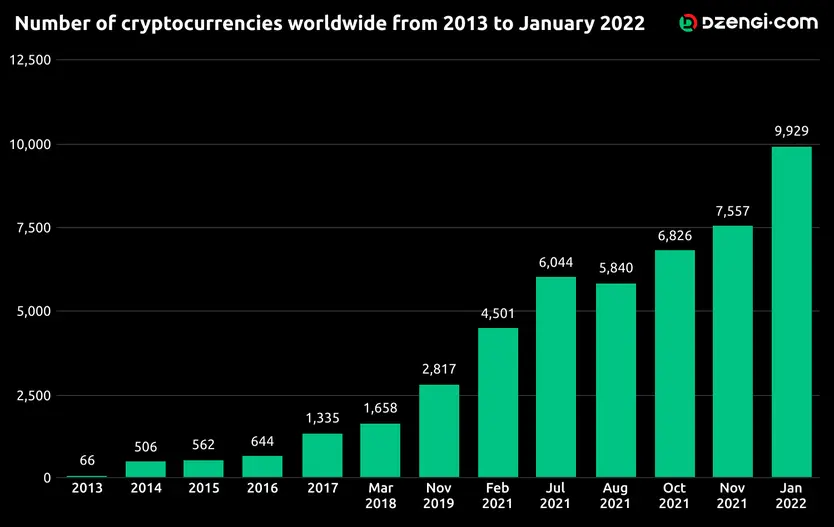
The industry’s market cap fluctuates on a regular basis – often driven by the performance of major digital assets such as bitcoin and ethereum. On 2 November 2021, BTC had a 44% share of the market but this is figure has decreased as altcoins show dominance. As of 27 January 2022, bitcoin holds a 41.6% market dominance.
Here’s a statistic that reveals how top-heavy the market is. The top five cryptocurrencies (bitcoin, ethereum, binance coin, tether and USD Couin) represent more than $1.18trn by market cap. Many of these smaller altcoins only have a collective value in the low millions – and often the price per coin can fall precipitously in the weeks and months following their launch. A sizeable number of the cryptocurrencies in circulation are ‘forks’ too. For example, bitcoin cash and bitcoin SV have split off from BTC, Ethereum split off from Ethereum Classic, and some argue that stellar is a hard fork of XRP.
How many cryptocurrencies will survive?
When it comes to how many cryptocurrencies will survive, it’s worth remembering that there’s a rather extensive graveyard of the digital assets that are no longer active. Many of these relate to initial coin offerings that were held during the boom of 2017 and 2018. In some cases, projects never came to fruition – and some investors lost a sizeable sum of money.
Others were later outed as scams. A notable example of this is BitConnect. At one point, BCC was one of the top 20 cryptocurrencies in terms of market cap. However, it was later revealed to be a Ponzi scheme – and the coin’s price quickly collapsed after the platform was closed down by administrators. Some digital assets fell off the radar because they weren’t used any more, others suffered devastating hacks that shook investor confidence and there have also been a few parody cryptocurrencies designed to be a joke.
How many types of cryptocurrencies are there?
As our guide explains here, there are seven main types of crypto assets out there. They include:
- Payment-focused digital assets such as bitcoin, litecoin and ethereum
- Stablecoins such as tether, which have value pegged to an underlying asset such as the US dollar
- Central bank digital currencies, a digitised version of fiat money that has been embraced by the likes of Sweden
- Privacy coins, which are designed to deliver anonymity to senders and receivers
- Governance tokens, which give owners the right to vote in decisions affecting a blockchain’s future development
- Utility tokens, which unlock access to particular services
- Non-fungible tokens, where each token has unique characteristics that separates them from all others.
Another question is how many cryptocurrencies are there going to be in five years’ time. It’s possible that we could see some consolidation in the markets, meaning that there will be a lower number of high-quality assets going forward. In the DeFi space, which enjoyed an explosion of popularity recently, we’ve already seen several protocols explore mergers so they can pool development resources and deliver more competitive yield farming incentives to users.
But how many cryptocurrencies exist will also be determined by whether levels of mainstream adoption increase in this decade, as widely expected. PayPal is now offering a crypto service to its users, which allows people to make purchases using digital assets with millions of merchants. If this is regarded as a success, we could see small businesses launch their very own tokens – potentially to reward their most loyal customers.
If Facebook’s Diem coin manages to get off the ground and appease investors, it is possible that other big companies will follow suit by building their own digital assets too. Should adoption pick up, the likes of Visa and Mastercard could begin to worry about their dominance in the digital payments space – and begin to get innovative.
How many different cryptocurrencies are there?
One problem that the crypto industry has had to contend with is that many digital assets fail to offer a compelling use case – something that proves that they are needed.
During the initial coin offering (ICO) boom of 2017, many opportunistic entrepreneurs decided to whack ‘blockchain’ on a white paper in order to drum up investor interest. In many cases, this worked – with some start-ups managing to command investments worth millions of dollars in a matter of seconds.
The market has started to mature now, and we are beginning to see new cryptocurrencies face greater levels of scrutiny as to whether they can add value. ICOs have also become a thing of the past. By and large, they have been replaced with initial exchange offerings (where a trading platform performs due diligence on a project) and security token offerings.
Although this may not fall into the scope of cryptocurrencies, one trend to keep an eye on in the decades to come is the rise of tokenisation. This is where physical items are reflected on the blockchain – and anything from real estate to university degrees and from gold to stocks can be tokenised.
How many crypto coins are there, and why cryptocurrencies matter
The choice of cryptocurrencies out there can be overwhelming. If you decide to invest in a smaller altcoin because you like the use cases it offers, do remember that low levels of liquidity may make it more difficult for you to sell it immediately at the desired price.
Many digital asset enthusiasts hope that cryptocurrencies will enable transaction fees to become much cheaper for consumers and merchants alike, with small businesses often having their thin profit margins eroded further by payment processing companies. Crypto can also help make cross-border payments much less expensive than they are now and far speedier than that which banks can currently provide. And last but not least, financial inclusion is a big buzzword in this industry – with many companies determined to reach unbanked populations who struggle to access everyday services at the moment.
FAQs
A cryptocurrency is a virtual currency and form of digital asset, also called a ‘token’ or ‘coin’, that uses cryptography technology to verify and secure transactions. Cryptocurrencies are typically decentralised and work on an open network called a ‘blockchain’ that functions as a public financial transaction database. It does not exist in physical form and the value is determined by supply and demand.
Cryptocurrencies offer an alternative to traditional government-issued fiat currencies and cash controlled by banks. Investing in crypto also offers the potential to make a profit. However, cryptocurrencies are highly volatile – before buying, you should research carefully first and never spend more than you can afford.
You can buy, sell and trade cryptocurrencies at a crypto exchange, such as Dzengi.com – a fully regulated tokenised assets platform.
